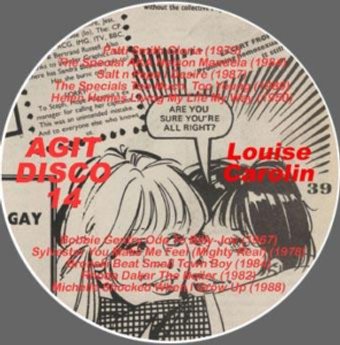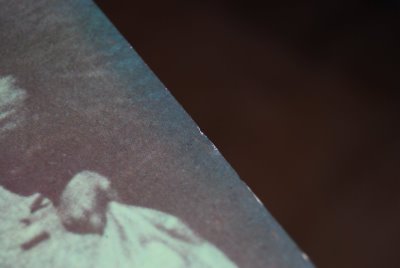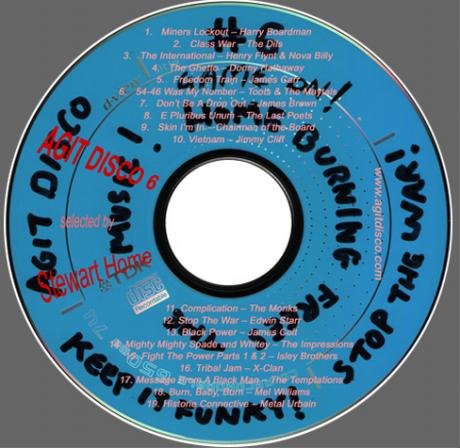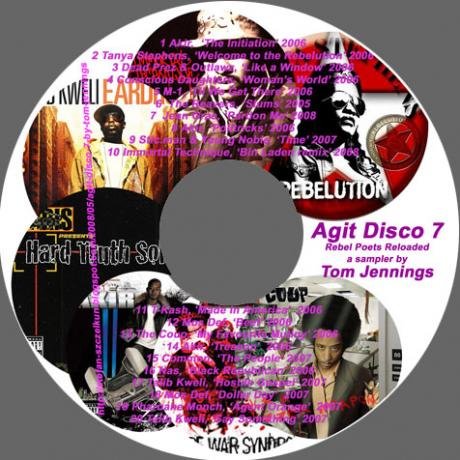Dissident Island Discs
Stefan Szczelkun's online project, 'Agit Disco', invites guest ‘DJs' to extract the politics from their music collections into mix CDs. How does this activist archiving add to the inherent politics of popular musics and their reception? - asks Anthony Iles
'Agit Disco' is one of those projects emanating from the blogosphere which doesn't call upon the authorisation of arts funding nor - though bearing the mark of various small-publishing, political and music-oriented milieus - fall into an established counter-cultural scene. And yet, it is not completely ambiguous about the question of whether it wishes to make one anew:
An Agit Disco would distil the politics out from the weak solution of popular musics. By counterpointing themes and problematising genres and bringing the more repressed and uncommon examples to the surface we might respark this potentially inflammatory material.
Contributors to the project are approached to make a mix CD from their own collection of music that somehow fits the 'Agit Disco' moniker - that is music that is politically upfront, but makes space for, or is evocative of, movements that seek to make a change without overtly using existing forms of political speech:
An Agit Disco is largely reliant either on lyrics or commentary and narratives to reconstruct contexts in any way possible without submitting to the banal idea that music, as a live force, is reliant on words for its force. 'Agit Disco' is about past musics but wedging it up into current affairs it is reinvented in the process of becoming a live performance or exchange of home-made CDs.
I would associate the range of figures who have contributed CDs to the project so far most closely with anti-authoritarian politics and DIY culture - self-publishing writers, DJs, pamphleteers, gay rights activists, artists, art groups. Other than a few individual associations, there is no sense of a coherence beyond some open interrogation of the political and the marginal, openly filtered through the personal connections of the project's initiator, Stefan Szczelkun. There is a sense in which the past engagements of two contributors in particular - Johnny Spencer and Howard Slater - with the politicisation and socialisation of music are the foundations from which Szczelkun builds this new set.

Image: 'Agit Disco' 14 by Louise Carolin
Johnny Spencer has for some time run the site Johnnyspencer.info where an incredible collection of original 7" soul, ska and rocksteady collectibles are archived, catalogued and reanimated. The adorning of each record sleeve with Spencer's drawings and sketches cathects the otherwise tight categorisation and commentary organising the tunes contained under those sleeves. There are several forms of giving here: giving the tunes away for free; giving the drawings to a fan-context; the giving of love and investment in the tunes; and giving of tribute to their makers and producers. Images of individual records in sleeves are laid out like an advent calendar behind the windows of which some mp3 downloads are available. This sequence of gifts, which connects the reproducibility of the tunes and the handmade (though equally reproducible) quality of each drawing, brings elements of dissimilar manufacture together into a relationship which singularises them and draws plural amateur identifications. Howard Slater's writing on music, in the pages of Break/Flow, Noisegate, Datacide, Mute and elsewhere, has tended to emphasise the marginal, polyvalent and disjunctive qualities of music or musics. The auto-theorisation of ‘music collections as living archives, played, discussed and referred to' forms the backbone of Szczelkun's project and leads him to the proposition of the archivist as activist made here on the 'Agit Disco' website.

Image: Dexys Midnight Runners record sleave, Part of Simon Ford's visual commentary to his 'Agit Disco' 10
I'm not so sure 'Agit Disco' has matched its expectations yet. I certainly don't think any of these collections make anyone an activist, not that any of the contributors are claiming that anyway. In many ways the idea for the project appeals to me and some if not all of the tracks do too (I don't need more Crass or Clash tracks thanks). But as a project it is self-admittedly incomplete and woefully inadequate. Though for any active listener this inadequacy might not be such a bad thing.
There is no archive without a place of consignment, without a technique of repetition and without a certain exteriority. There is no archive without outside.1
'Agit Disco' is one of a number of recent projects which reconsider the political agency of music (or the musical agency of politics). One circulating within the comfortably approved margins of independent music and the contemporary art world is 'Her Noise' - a project by and for ‘grrrls' who rock and women in experimental music (South London Gallery, 2005). The most prominent of many archives of the outside currently finding themselves inside the mega-archive of the contemporary museum are Jeremy Deller's Acid Brass and the tangential music (non-conformist, pop and postindustrial) cultures represented in his 'Folk Archive'. There are also Mark Leckey's videos, such as Fiorucci Made Me Hardcore (1999), which revel in the libidinal energies of subcultures from northern soul to rave. All of these look beyond that bedrock of cultural studies academicism, (Dick Hebdige's Subcultures), to what remains more than neatly subversive in musical culture - to what lingers and propels itself into the present through its openness to more than style or self-identification.
[..] overall the 'Agit Disco' project is about asking the question of how we can better use our heritage of political music. Can it be made more potent through a process of mixing, recontextualisation, concentration and discourse? How is it remembered?
That these CDs pose the question, rather than directly forming a contribution to that tradition or (God forbid) ‘heritage', is itself a marker of the particular technical and economic juncture the musical commodity is at. With enormous, endlessly reconfigured, mobile archives out there on the internet, label compilations and archival releases are some of the better sellers in a dwindling music market. The questions of what we are listening to and what the currency of what we are listening to is are pressing ones. Yet it is also clear too that these questions run before us, sometimes getting in the way of new music, blocking our ears to it.

Image: 'Agit Disco' 6 by Stewart Home
There is a tendency towards music which wears its political content safely in its lyrics. But what of instrumental music? Is music with no lyrical content never political? What of the milieus around musical production? Could we leave Jazz (largely instrumental) out of any discussion of politicisation and music? Techno and Jungle? And if we can talk of a politics that does not claim to represent its aims or political demands - then can't music also build a politics out of its very material, form and delivery?
In some sense trying to represent the unrepresentable (and why does music have to be represented anyway?), as well as the proliferation of scenes around music and their signification, 'Agit Disco' runs the danger of getting stuck in a particular groove. Immediately wary of obvious choices and limits, Peter Conlin writes in the sleeve notes to his compilation: ‘Music picks are largely lifestyle choices, and lifestyle politics is really only the beginning.' The legacy of political music arrives at the party with preconceptions but doesn't allow itself to settle, or to lose itself on the dance floor or equally in a row (really) over a misplaced jacket, spilt beer or the details of a remix, a label or the particular point at which a band sold out. Here, the project is somewhat lacking, it is missing much of the bickering and positioning that makes new music. Arguments over who dropped a tune first through to bitter partisan genre-baiting, (as in the online argument over funky house vs dubstep between music bloggers Martin Blackdown and Woebot), actually play a key role in how certain musical scenes delimit themselves, find definition and hopefully either play off each other productively or escape.2 At times it feels like there is too little of this here in 'Agit Disco', that the pressure of the archive eschews the forms of over-identification in music that make it something worth fighting over at all.

Image: Dead Kennedys record sleave. Part of Simon Ford's visual commentary to his 'Agit Disco' 10
Though a sexualisation of music adequate to the celebration of a politics of pleasure is hinted at in Louise Carolin's sleeve notes for her compilation, this is actually an aspect surprisingly absent from most of the CDs or sleeve notes. Though we encounter explicit lyrics and groovy tracks across many of the selections, few inflect the myriad points at which music, sexuality and politics meet. There is plenty of room here for the dual sexualisation and politicisation of electronic music enacted by, for example, Terre Thaemelitz. More generally 'Agit Disco' suggests to me the possibility of drawing attention to the powerful ability of scenes to appropriate apparently ideologically opposed music. This could bring into range the way that sexuality and politics in music both dissembles and discloses in itself an erotics - a relationship of dynamic movement across the limit of what is possible or permitted.
This is truly a missed opportunity when Tom Jennings, who compiles many less conformist hip hop and dancehall artists on his offering, has elsewhere explored the centrality of sexuality to Jamaican dancehall.3 For a female voice to be sexually explicit, demanding and intelligent is not so rare in the history of music, nonetheless the sheer frontal assault and aggression of artists such as Tanya Stephens who challenge the rigid sexual mores predominantly associated with dancehall can make it appear so. If it seems like an omission to use Stephens' brash album opener ‘Rebelution' rather than the tightly coiled confrontation of a track like ‘After the Sex', we'll have to take on board Jennings' careful qualification: ‘in general, "oppositional" rap orientations tend to percolate throughout material rather than condensing into exemplary tracks'. This is true and yet the contrariness within dancehall and reggae is worth noting and developing. Here, we find out what we already know instinctively as teenagers but forget, that music is always about posturing. Without this knowledge, those seeking a coherent politics from these genres would otherwise be confounded by so many artists who chant for peace and love one moment only to spit bloody lyrics and vitriol the next. As Stewart Home says in Cranked Up Really High, his irreverent genre study of punk, ‘coherence is death, whereas living cultures are generated from the tensions generated around clusters of contradiction'.

Image: 'Agit Disco' 7 by Tom Jennings
'Agit Disco' as a project so far seems to shrink from actually examining a political economy of music - that would spoil the fun - but then neither (with the exception of Slater's genre-busting dance set) is the project quite confident or irreverent enough just to let us loose in it and forget about the politics (only to let them ‘percolate' through in other ways?). The questions the project asks of politics and music are at the very heart of meaningful culture. In both repeating and deleting certain clichés about political music, it forces the listener/reader to note how much there is out there and how clearly all music is spoken of in political terms, especially the further it is from formal politics. It is enough that it makes us want to make our own selection and that this also leaves us with a politics that we have to make ourselves whilst listening or dancing. This would be a process that could be accompanied by music that is not ‘political' but rather that expresses ourselves in politicised conditions and subjectivities. A situation that has the potential to lead us to the conditions for a politics that is always (as in live, improvised, pre-release or dubplate material) in the making.
Anthony Iles <anthony AT metamute.org> is a contributing editor of Mute
Info
Agit Disco
John Eden
Her Noise
http://www.electra-productions.com/about/touring_her_noise_doc.shtml
K-Punk
http://k-punk.abstractdynamics.org/
DJ/Rupture
Blackdown
http://blackdownsoundboy.blogspot.com
History is made at night
http://history-is-made-at-night.blogspot.com/
Woebot
Footnotes
Except where otherwise cited, all quotes from http://www.agitdisco.com
1Jacques Derrida, Mal d'Archive: Une Impression Freudienne, Paris: Galilee, 1995. Translation from http://www.hydra.umn.edu/derrida/arch.html
2See: http://www.woebot.com/2007/03/funky_house.html , and, http://blackdownsoundboy.blogspot.com/2007/04/uh-oh-woebot-trying-ting.html
3 See his ‘Dancehall Dreams' Variant, 20, June 2004
Mute Books Orders
For Mute Books distribution contact Anagram Books
contact@anagrambooks.com
For online purchases visit anagrambooks.com






